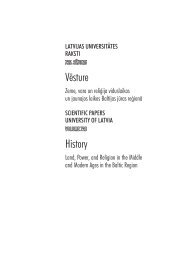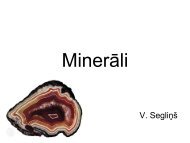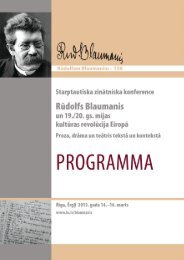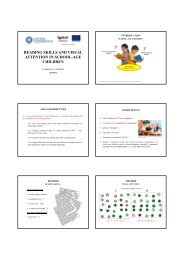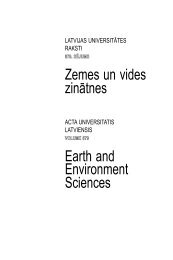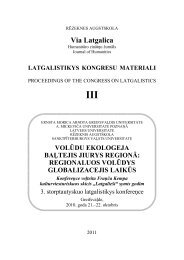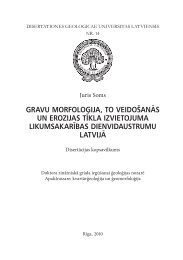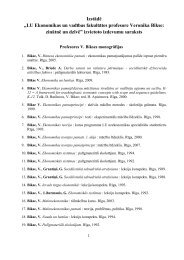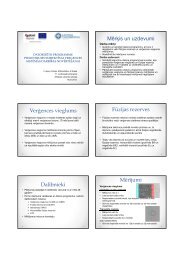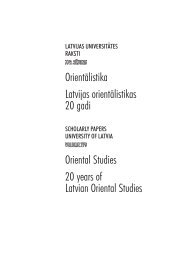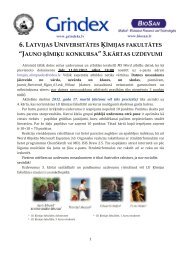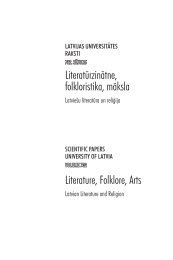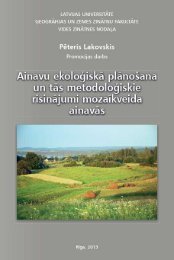Untitled
Untitled
Untitled
You also want an ePaper? Increase the reach of your titles
YUMPU automatically turns print PDFs into web optimized ePapers that Google loves.
132 LITERATÛRZINÂTNE, FOLKLORISTIKA, MÂKSLA<br />
vast expanses of land and sea is to separate humans from one another. Hence the importance<br />
of systems of transport and communication– whose motor is trade– for overcoming<br />
such elemental adversity and for bringing humans, against the odds, into contact.<br />
Understood at this humbling level– from the perspective of vulnerable creatures<br />
clinging to a finite, limited planet, mastering as best they can, the hostility of climate<br />
and terrain– the diligent activity of traders emerges as valiant and constructive.<br />
Whereas sea–robbers and pillagers work against the natural law in their disrespect<br />
for the primordial right to hospitality (since no human is originally more at home on<br />
this planet than another), traders, cognisant of the attendant dangers of travelling to<br />
foreign territories, build up helpful reciprocal arrangements for the protection of<br />
goods and for the shelter of the person. As such the spirit of trade (Handelsgeist) is<br />
seen as paving the way towards an eventual cosmopolitan constitution establishing<br />
international law and universal human rights.<br />
Despite such apparently wholehearted and misguided optimism, Kant reveals himself<br />
to be equally well aware of the detrimental effects commercial rivalry can have on<br />
human minds and behaviour. In the Anthropology he defines the Handelsgeist as intrinsically<br />
“unsociable” (an sich ungesellig), each business being a trader’s castle separated<br />
from others as if by a drawbridge, prohibiting friendly, informal intercourse. 15 He is also<br />
not ignorant about real world trade practises. Like Herder, he shows himself in the “Perpetual<br />
Peace” essay to be well informed about the “inhospitable” conduct of “civilised”<br />
trading states whose only conception of foreign lands is one of zones inhabited by inferiors<br />
to be colonized and exploited mercilessly. Discussing the “cruellest and most calculated<br />
slavery” of the Sugar Islands, Kant acidly concludes: “And all this is the work of<br />
powers who make endless ado about their piety and who wish to be considered as chosen<br />
believers while they live on the fruits of iniquity”. However, his ensuing sentence,<br />
whose logic might well seem contradictory, runs as follows:<br />
The peoples of the earth have thus entered in varying degrees into universal<br />
community, and it has developed to the point where a violation of<br />
rights in one part of the world is felt everywhere16 . 17<br />
His guiding idea appears to be that the development of long distance<br />
trading, with all its concomitant injustices and abuses of power, is<br />
steadily becoming a global phenomenon. A positive outcome of this expansion<br />
is the proliferation of links between disparate parts of the earth<br />
and the ensuing gradual formation of a world community. Indeed the<br />
mere fact of this Königsberger professor being informed about slavery<br />
in the West Indies, indicates just how open lines of communication were<br />
becoming. Kant’s suggests that injustices in one part of the globe reverberate<br />
along these ever developing lines of communication, consolidating<br />
a public sphere which is, which should, be the concern of all rational<br />
beings. Slavery in the West Indies, as the inverse of an event like the<br />
French Revolution, analysed in Conflict of the Faculties, is another type<br />
of “sign of history”; it “can never be forgotten”. 18<br />
Kant is keen to defend his vision of a future cosmopolitan community from accusations<br />
of fanciful thinking and hastens to reassure those who are sceptical of humans’<br />
capacity for perfectibility, that it is not reliant on us overturning nature and becoming



